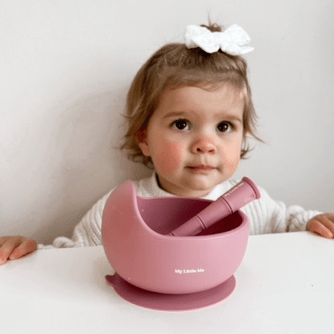Introducing solid foods to your baby is an exciting milestone, but it’s essential to approach it mindfully. Your little one’s digestive system is still developing, and certain foods can pose risks. Below, we cover the foods to avoid when starting solids and tips for making safe food choices to support your baby’s growth and development.
1. Honey
Avoid giving honey to babies under one year old, even in cooked or baked foods. Honey can contain spores of a bacteria that may cause infant botulism—a rare but serious illness that affects babies' nervous systems and can be life-threatening. To keep your little one safe, wait until after their first birthday to introduce honey in any form.
2. Cow’s Milk
While small amounts of cow’s milk can be added to food or used in cooking, it should not be given as a primary drink until your baby is at least one year old. Babies under 12 months have difficulty digesting cow’s milk fully, and it lacks essential nutrients that breast milk or formula provides during this critical growth stage.
Once your child turns one, you can start offering full-fat cow’s milk, as it provides beneficial fats and nutrients to support healthy growth and brain development.
3. High-Mercury Fish
Certain fish can contain high levels of mercury. Mercury can be harmful to a baby’s developing nervous system, so it’s best to avoid these fish when preparing meals for your little one—and during pregnancy as well. Fish tend to have higher mercury levels if they are long lived, predatory, or live in lakes and rivers fed by geothermal sources. Examples of fish that may contain high levels of mercury include dogfish, swordfish, marlin, some varieties of tuna, and trout from geothermal locations.
Instead, opt for fish that is low in mercury that is safe for babies:
Salmon
Sardines
Blue cod
Tarakihi
Hoki
For additional guidance, refer to New Zealand food safety guidelines.
4. Unpasteurized Dairy Products
Avoid giving your baby raw or unpasteurized dairy products, including milk, certain soft cheeses, and yogurt, as these can contain harmful bacteria like E. coli and Salmonella. These bacteria can lead to severe illness in young children. To ensure safety, always choose pasteurized dairy products for your baby.
5. High-Sodium Foods
Avoid giving your baby foods high in salt. Babies’ kidneys are still developing and cannot efficiently process excess sodium, making it important to keep their intake low. If you prepare homemade baby food, skip the added salt and choose fresh or naturally unsalted ingredients. Also, check sodium levels in packaged or frozen foods, as these can sometimes contain hidden salt.
For babies aged 6-12 months, the sodium in breast milk or formula, along with naturally low-sodium foods, is sufficient to meet their needs. After one year, it’s still important to limit added salt in their diet. Look for low-sodium options of commonly purchased items.
6. Added Sugar
Limit foods with added sugar. Babies don’t need extra sugar and introducing it too early can encourage a long-term preference for sweet foods, which can increase the risk of poor oral health and unhealthy eating habits later on. When choosing foods for your baby, check ingredient labels for hidden sugars and opt for options with no added sugars.
7. Choking Hazards
Young children are at an increased risk of choking, so it’s essential to avoid or modify certain foods to make them safer. Here are some types of foods to watch out for:
Sticky foods: Such as marshmallows and thick globs of nut butters, as these can stick in the throat.
Round foods: Whole grapes, cherry tomatoes, blueberries and sausages should be sliced lengthwise and into small pieces to prevent choking.
Hard or Raw Foods: Raw apples, raw carrots, and other firm fruits and vegetables should be avoided or modified to make them safer. Prepare these foods by grating, finely shredding, or cooking them until soft. This helps ensure they are easy for babies to chew and swallow safely.
Whole nuts and seeds: Whole nuts are a serious choking hazard for babies and young children due to their small, hard shape and the difficulty babies have in chewing them properly. To keep mealtimes safe, it’s best to avoid offering whole nuts to children under four years old.
Always supervise your baby and ensure they are seated upright during mealtimes.
Tips for Safe Food Choices
Soft and Mashable: Begin with foods that are soft and easy to mash between your fingers. This makes them easier to swallow and reduces choking risks.
Go for Whole Foods: Minimize processed foods to avoid unnecessary additives. Whole foods ensure your baby gets the best nutrition.
Monitor for Allergies: If your family has a history of allergies, talk to your healthcare provider about how to introduce potential allergens like peanuts, eggs, and dairy. Research suggests that introducing allergenic foods between 6-12 months may reduce the risk of allergies later.
Hygiene Matters: Always wash fruits and vegetables thoroughly. Ensure your hands, utensils, and surfaces are clean before preparing your baby’s food.
Starting solids is a memorable step for both you and your baby. While it’s important to be cautious about food choices, remember that this phase is also about exploration and enjoyment. Keep it fun, offer a variety of flavours and textures, and watch your baby’s reactions closely to build positive mealtime experiences.Happy feeding!
My Little Me
